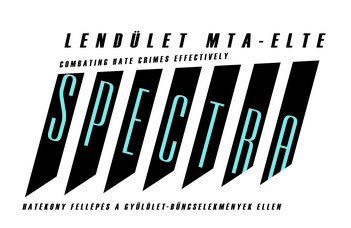About the project

About the research group
The Research Group SPECTRA led by Associate Professor Petra Bárd deals with the social prerequisites for the effective fight against bias-motivated crimes through criminal law and minority rights protection. It was supported by the Momentum (in Hungarian: Lendület) programme of the Hungarian Academy of Sciences and is hosted by the Criminology Department of ELTE University Faculty of Law. SPECTRA was established in 2018. This was the first time that a social science research group from ELTE University, Faculty of Law was supported in the framework of the Momentum programme.
Seven practitioners and researchers with various scientific backgrounds joined the team: Ildikó Barna, Head of Department, ELTE Faculty of Social Sciences, Department of Social Research Methodology; Tamás Dombos, Board Member of Háttér Society; Borbála Fellegi and Gábor Héra, Executive Director and Researcher, Foresee Research Group; Eszter Kirs, Associate Professor, Corvinus University of Budapest, Institute of International Studies; Veronika Szontagh, Junior Research Fellow, Centre for Social Sciences Institute for Legal Studies; and Erik Uszkiewicz , Ph.D. Candidate, ELTE University Faculty of Law.
Background
According to the definition in the academic literature, the term hate crime does not refer to a specific criminal act, it is rather a criminological concept, an umbrella term that covers a group of crimes committed with a bias motive.
Consequently, hate crimes have two necessary elements: on the one hand, there needs to be a so-called ‘base crime’ (typically homicide, assault, harassment, vandalism, public nuisance) and on the other, the bias element has to be present, when the perpetrator chooses a victim only because he or she belongs – or the perpetrator believes them to belong – to a certain societal group. Victims of hate crimes are typically attacked in their identity or for an unchangeable, innate characteristic. Therefore, the crime’s impact on the victim, on the victim’s group, and society as a whole is more severe for hate crimes than for base crimes.
Research project
The research group will map the effective means against hate crimes, and the prerequisites for these means to be successful. Criminal law is only one of the possible response mechanisms to hate crimes and not necessarily the most effective one. But even the efficiency of criminal law depends on numerous social factors. According to official crime statistics, extremely few hate crime cases come to the attention of law enforcement authorities across Europe. The research hypothesis is that this can be traced back to broader societal problems, but also anomalies of codification and the application of laws, both in the investigation and the trial phases of criminal procedures.
During its five years of operation, the research group summarises and assesses international legal obligations; reviews the Hungarian and international academic literature; analyses the legislative techniques of the European Union’s member states; compares relevant laws and regulations of national criminal codes; and identifies existing good practices.
The above exercise will be followed by a detailed overview of the application of the law in selected Hungarian hate crime cases: the research group will map and present the Hungarian case-law related to the application of specific provisions of the Hungarian Criminal Code. Based on the extensive empirical research complementing the theoretical findings, conclusions will be drawn about the sources of difficulties in the application of the law, and recommendations will be formulated.
The research group also examines the chances of victim support and possible restorative justice methods as tools for resolving social tensions that could potentially lead to hate crimes.
Other significant goals of SPECTRA are to publish the research results in Hungarian and international scientific journals, and to disseminate the findings at conferences, trainings and workshops.
***
Anna Rácz interviewed SPECTRA research group leader Petra Bárd in connection with the details of the research. The interview can be accessed via the main website of ELTE University, Faculty of Law.

